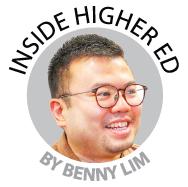ACADEMIC titles are ranks given to faculty members in an educational institution. These titles are hierarchical and subject the holders to certain rights and benefits, including salary increments.
Moving up an academic rank, or an academic promotion, is often regarded as a form of recognition and achievement. In fact, it is not uncommon for faculty members to join other institutions in pursuit of better prospects in academic promotions.
Universities could develop their own academic ranking system. Most private universities in Malaysia observe the following academic titles (in ascending order) – Assistant Lecturer, Lecturer, Senior Lecturer, Associate Professor, Professor.
A faculty member could therefore progress to an associate professor from a senior lecturer position. This is quite unlike universities in Singapore and Hong Kong, where lecturers and professors are on two completely independent tracks.
The title of Assistant Professor is less common in Malaysia and is used by some private universities as a replacement to the Senior Lecturer title.
While private institutions of higher learning (IPTS) are primarily teaching institutions, many IPTS strive to be upgraded to a university so as to stay competitive.
Existing universities also seek to excel in local SETARA ratings, with some even taking on global rankings.
This has essentialised the importance of research outputs. Private universities now demand for research-active academicians, who are usually employed at professorial levels.
While research seems crucial, most academic promotion policies consider teaching, research, and service as key criteria for academic promotions, though, for different academic ranks, the weightage for each criterion varies.
For instance, the weightage allocated to research for promotion from lecturer to senior lecturer is likely to be much lower than that of associate professor to full professor.
Service covers a wide range of possibilities, which could include external roles such as consultancy, professional practice, external academic duties by invitation, as well as internal contributions to the university, such as taking on academic administrative positions.
In most private universities, an upward move from lecturer to senior lecturer requires academicians to have demonstrated excellence in teaching, alongside some evidences of research, such as conference presentations and/or journal publications. The requirements are generally reasonable, since lecturers devote most of their time teaching.
Similar to their juniors, senior lecturers in private universities are assigned heavy teaching loads between 500 and 600 hours (or more) per academic year. Yet, the teaching component is significantly less substantial in the academic promotion to associate professor.
Despite their teaching loads, senior lecturers are expected to churn out research papers in reputable journals in order to be considered for academic promotion.
Personally, I have quite a number of friends in this senior lecturer “crisis”. Many of them were promoted to senior lecturer in the early years of their academic careers due to their teaching excellence. However, their lack of research outputs kept them in their current position for a long time.
Some has continued to contribute actively to pedagogical development, while others have also built on their professional practice. It is disheartening to discover that common academic promotion policies prevent them from going beyond their senior lectureships. This also translates to their salaries being capped to a certain range for a big part of their career.
Of course, there are ways to breakthrough this crisis. One obvious way is for these academics to publish their pedagogical and/or professional contributions. Another option is to consider taking up academic leadership roles.
While both routes seem viable, they do come across as subordinating teaching and professional practice to research and management.
Private universities should perhaps consider incorporating the title of principal lecturer, which is a terminal, standalone teaching position for senior lecturers who have substantial contributions to teaching and pedagogical developments. A principal lectureship should be made equivalent an associate professor.
For practice-active academicians, universities could introduce titles such as Professional Consultant/Senior Professional Consultant or Associate Professor/Professor of Practice. On the same note, established practitioners who wants to switch careers to academia could have multiple pathways of entry, other than senior lectureship.
For instance, an award-winning creative director of an international advertising firm could join the advertising faculty of a university as an associate professor of practice.
In order for private universities to attract and retain good faculty members, they have to institute multiple academic promotion pathways, so that research-, teaching-, and/or practice-active academicians could have a fair chance of moving up the academic ranks.
Dr Benny Lim is currently a professor and the director of the Master programme in communication and media studies, Università Telematica Pegaso (Italy), as well as a visiting scholar of cultural studies with the Chinese University of Hong Kong. The views expressed in this article are his own and do not represent the universities he is associated with.













